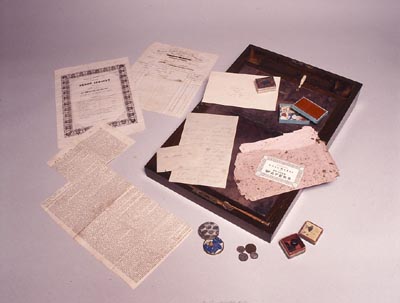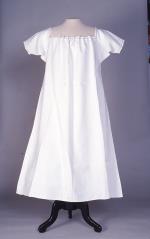
Emily Bronte's fold-up writing desk and contents; desk is rose-wood inlaid with mother-of-pearl round the key-hole in a simple design and has a purple velvet lining; pen compartment; two ink bottle compartments; incomplete; fair condition; 453mm l x 303mm [desk laid open] desk contents: three pieces white/cream sealing wax,
metal writing pen with broken handle, small piece pink/white card, metal pen handle , metal pen nib with embossed letter T, green sealing wax, cracked, fragment dirty woven material, triangular fragment white/cream plaster, piece of cream waxed paper, piece folded black paper, faded, white/blue round box containing blue, green and yellow circular and rectangular wafers, card- box contains lumps of sealing wax; quill pen nib , multi-colour card box containing 4 sealing wax circles and a sticker; metal seal with criss-cross pattern & ivory handle, two red wax seals on cream paper, metal pen nib, piece red sealing wax, newspaper review Wuthering Heights , newspaper review Wuthering Heights from Britannia, card box contains wax circles, puzzle wafers, sealing wax, two small pieces crochet lace.
 Emily's desk.
Emily's desk.

| Emily Jane Bronte, Christening mug. |


Brass collar for Emily's dog, Keeper. Emily's piano.



Chemise worn by Emily Dog Collar....Keeper or Grasper. Emily's hair.
| Hope |
| by Emily Jane Bronte |
| Hope Was but a timid friend; She sat without the grated den, Watching how my fate would tend, Even as selfish-hearted men. She was cruel in her fear; Through the bars one dreary day, I looked out to see her there, And she turned her face away! Like a false guard, false watch keeping, Still, in strife, she whispered peace; She would sing while I was weeping; If I listened, she would cease. False she was, and unrelenting; When my last joys strewed the ground, Even Sorrow saw, repenting, Those sad relics scattered round; Hope, whose whisper would have given Balm to all my frenzied pain, Stretched her wings, and soared to heaven, Went, and ne'er returned again!  |


A copy of Emily's couch.

This photo is on Ebay for sale.
![The Bronte's Table [8Kb] The Bronte's Table [8Kb]](http://image.wetpaint.com/image/1/kwDnwf3_djum2ZHDdU8fKg7993/GW275H216)
Details of a Past Exibit The table that witnessed the creation of Wuthering Heights, Jane Eyre - two of the finest novels in the English language - will be seen in public for the first time in a major exhibition. The Brontë table, owned privately, is one of the highlights of the British Library’s forthcoming Chapter & Verse exhibition in its Pearson Gallery. Sisters Charlotte, Emily, Anne and their brother Branwell used the table from childhood and Wuthering Heights, Jane Eyre and The Tenant of Wildfell Hall were amongst the works produced on it. In a literary coup manuscripts from all four siblings will be reunited with - and displayed on - the table for probably the first time in over 150 years. Made from Cuban mahogany on an oak base, the table is a real writer's work-place, stained with ink spills and scarred in the centre with a large candle burn. At one end a bold letter E is carved into the surface, almost certainly the work of young Emily, whose initial can also be seen in the notebook of her poems that will be displayed on the table. Other items on the table will include a manuscript of Anne's long poem Self-Communion and one of the imaginary histories the four children produced together which features a map by Branwell - as well as the handwritten manuscript of Charlotte's Jane Eyre, open to show Rochester's proposal. Each night after their father retired to bed, the sisters would walk around the table and discuss their writing. After the early deaths of her brother and sisters, Charlotte was unable to break the habit and sadly continued the nightly routine on her own.The table is in private ownership; it was purchased at the sale of the household effects of the parsonage after the death of Reverend Brontë in 1861 and was sold soon afterwards to the family in whose possession it has since remained. It has only once been seen outside the family when it was lent to the Brontë museum at Haworth for a short period. It has been lent anonymously to the British Library for the purposes of this special Millennium exhibition. | ![The Bronte's Table [8Kb] The Bronte's Table [8Kb]](http://image.wetpaint.com/image/1/kwDnwf3_djum2ZHDdU8fKg7993/GW275H216)
Chris Fletcher, curator of Chapter & Verse, who arranged the loan of the table, said, "This table played an important and moving part in the extraordinary imaginative world of the Brontës. It clearly became a focus for their creative efforts, whether individual or collaborative. To be able to reunite the manuscripts with the table upon which they were created - and which seemed to play such an essential part in their creation - is a remarkable and powerful thing." The table will be one of the three hundred or so exhibits that form Chapter & Verse in the Pearson Gallery at the British Library, which opens on March 10. |
Author: Matthew Arnold ....written on Charlotte Bronte's death but is true for Emily, Ann and Branwell.
--How shall we honour the young,
The ardent, the gifted? how mourn?
Console we cannot, her ear
Is deaf. Far northward from here,
In a churchyard high 'mid the moors
Of Yorkshire, a little earth
Stops it for ever to praise.
Where, behind Keighley, the road
Up to the heart of the moors
Between heath-clad showery hills
Runs, and colliers' carts
Poach the deep ways coming down,
And a rough, grimed race have their homes--
There on its slope is built
The moorland town. But the church
Stands on the crest of the hill,
Lonely and bleak;--at its side
The parsonage-house and the graves.
Strew with laurel the grave
Of the early-dying! Alas,
Early she goes on the path
To the silent country, and leaves
Half her laurels unwon,
Dying too soon!--yet green
Laurels she had, and a course
Short, but redoubled by fame.
And not friendless, and not
Only with strangers to meet,
Faces ungreeting and cold,
Thou, O mourn'd one, to-day
Enterest the house of the grave!
Those of thy blood, whom thou lov'dst,
Have preceded thee--young,
Loving, a sisterly band;
Some in art, some in gift
Inferior--all in fame.
They, like friends, shall receive
This comer, greet her with joy;
Welcome the sister, the friend;
Hear with delight of thy fame!
Round thee they lie--the grass
Blows from their graves to thy own!
She, whose genius, though not
Puissant like thine, was yet
Sweet and graceful;--and she
(How shall I sing her?) whose soul
Knew no fellow for might,
Passion, vehemence, grief,
Daring, since Byron died,
That world-famed son of fire--she, who sank
Baffled, unknown, self-consumed;
Whose too bold dying song[2]
Stirr'd, like a clarion-blast, my soul.
Of one, too, I have heard,
A brother--sleeps he here?
Of all that gifted race
Not the least gifted; young,
Unhappy, eloquent--the child
Of many hopes, of many tears.
O boy, if here thou sleep'st, sleep well!
On thee too did the Muse
Bright in thy cradle smile;
But some dark shadow came
(I know not what) and interposed.
Sleep, O cluster of friends,
Sleep!--or only when May,
Brought by the west-wind, returns
Back to your native heaths,
And the plover is heard on the moors,
Yearly awake to behold
The opening summer, the sky,
The shining moorland--to hear
The drowsy bee, as of old,
Hum o'er the thyme, the grouse
Call from the heather in bloom!
Sleep, or only for this
Break your united repose!

No comments:
Post a Comment